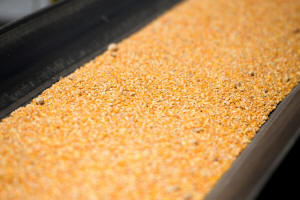U.S. farmers urge Washington to challenge Mexico's looming ban on GM
corn
 Send a link to a friend
Send a link to a friend
 [September 26, 2022]
By Cassandra Garrison [September 26, 2022]
By Cassandra Garrison
MEXICO CITY (Reuters) - Farmers in the
United States are urging their government to challenge a looming Mexican
ban on genetically modified (GM) corn under a regional free trade
agreement, warning of billions of dollars of economic damage to both
countries.
A late 2020 decree by Mexico President Andres Manuel Lopez Obrador would
phase out GM corn and the herbicide glyphosate by 2024. Supporters of
the ban say GM seeds can contaminate Mexico's age-old native varieties,
and point to research showing adverse effects of glyphosate.
Mexico prides itself as the birthplace of modern corn but it imports
about 17 million tonnes of U.S. corn a year and is on track to import
even more this year, experts said.

Some in Mexico's government, including Agriculture Minister Victor
Villalobos, have signaled that yellow corn imports for livestock feed
will not be disrupted. U.S. farmers remain wary since no official
document states that, according to a U.S. agriculture official familiar
with recent meetings with Mexican officials.
Also, Lopez Obrador this month said firmly: "We do not accept GMO corn."
Corn for human consumption, including white corn used in food products
like tortillas, accounts for between 18% and 20% of Mexico's total U.S.
corn imports. There are still questions about whether such GM imports
will be eliminated by 2024.
Mexico's health regulator COFEPRIS has not authorized new strains of
glyphosate-resistant GM corn seeds for import since 2018. The National
Corn Growers Association, representing U.S. farmers, wants the U.S.
Trade Representative (USTR) to launch a dispute settlement proceeding
under the USMCA trade pact, which includes Canada and Mexico.
Angus R. Kelly, the association's director of public policy, trade and
biotechnology, said it objects to the "precedent-setting nature of the
decrees" and to Mexico rejecting biotech crop traits "without any
scientific basis."
Washington could potentially raise a dispute under the agriculture
chapter of the USMCA stipulating cooperation between members on an
individual government's regulation of imports, according to Raul Urteaga,
a former Mexican government official and founder of consulting group
Global Agrotrade Advisors.
[to top of second column]
|

A conveyor belt moves yellow corn
imported from Brazil as it is unloaded from a ship, at a warehouse
in the port of Tuxpan, in Veracruz state, Mexico September 23, 2022.
REUTERS/Yahir Ceballos

A dispute settlement can apply under some USMCA chapters when a
country considers one member government has nullified or impaired a
benefit that was in place when the pact was signed.
Mexico's agriculture ministry and the U.S. embassy in Mexico
declined to comment. The USTR and the USDA did not respond to
requests for comment.
Biotechnology Innovation Organization (BIO), representing biotech
companies including Bayer, said it "supported the (U.S.)
administration taking enforcement action on Mexico’s treatment of
agricultural biotechnology" if dialogue fails.
Federico Zerboni, Argentina-based president of agriculture chamber
MAIZALL which sent a delegation to Mexico in August, said denial of
new GM seeds made it seem like Mexico's regulator favors a "very old
and unfeasible production system to feed the world."
COFEPRIS, in a statement to Reuters said its decisions were based on
"scientific evidence and risk assessments."
In 2020, Bayer agreed to pay billions of dollars to settle lawsuits
by people who claimed they were harmed by its weedkiller.
A March report by the U.S. consulting firm World Perspectives Inc
projected that Mexico's ban could cost the country $4.4 billion over
10 years for corn imports, push the price of tortillas up 42% by the
second year and cause major risks to food security.

The United States could see a $16.5 billion drop in economic output
over 10 years, the report found. It did not differentiate between
white and yellow corn.
(Reporting by Cassandra Garrison, additional reporting by Tom
Polansek in Chicago and Andrea Shalal in Washington; Editing by
David Gregorio)
[© 2022 Thomson Reuters. All rights
reserved.]
This material may not be published,
broadcast, rewritten or redistributed.
Thompson Reuters is solely responsible for this content. |